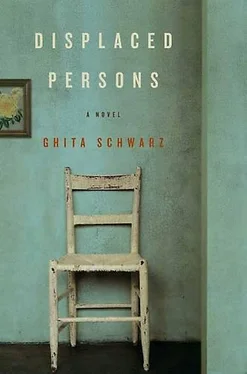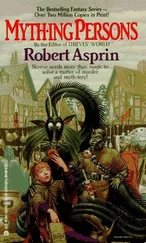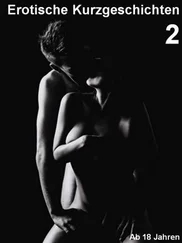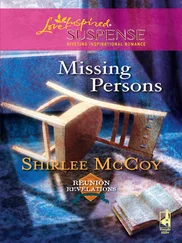Had he gone back in time? He tried to say something-to ask her if she had enough to eat-but he could hear it as a groan, and a nun hurried over with a syringe.
Sometime later he saw Fela again, her belly even more round against her slim frame, and he understood, his mind was clear, he could not move the muscles at his jaw, but he tried to signal her with his eyes. He could see she sensed him awake and lucid, he was there with her, she knew, because she began to talk to him more slowly, the words moving through his pounding head in soft drops of water, soft drops of milk, the baby would be healthy, one did not want to say too much of course, bad luck, but it was a healthy pregnancy, and soon it was only three more months, only two more months, only one more month.
Emigration was out of the question now. Hinda, having left England for New York with Kuba and their infant, told him in a letter read to him by Yidl that he would not be able to come, that there had been a change, that their cousin Mayer, waiting in the American zone, would be next. Yidl had read it lightly, and Hinda’s words did not go into detail, but Pavel had heard about it enough times that he understood. Americans did not want the injured, did not want those who would become what they called a charge to the public, dependent, unable to provide for their families, poor. It had been hard enough as Jews-the visas seemed to go only to the gentiles fleeing the Russians, it was Russia who was now the world’s enemy-it had been hard enough, and now-well, now, where would he go with his family? Palestine would take them, would take anyone now that the borders were open, but how would Pavel make a living there, so broken, when all there would be for him was manual labor, physical work?
He lay there shaking, pushing out a question to Yidl, a name he would not let himself utter in front of Fela: Where is Marek Rembishevski? Where is Marek Rembishevski?
Yidl kept his face blank. Your wife wanted to find him, but we heard he went to America.
After Yidl left with the letter, Pavel turned his neck to the wall. There was no window here. When they came in to feed him his liquid food, he pushed it away. No.
He could not open his lips to whisper to Fela when she came to talk to him that evening, nor the next morning. She took his hand and stroked it, as she had in the early days of their marriage, and said, Pavel, Pavel, what has happened?
He wanted to answer her, comfort her. But when he opened his lips slowly, slowly so as not to injure his jaw further, he felt his mouth aching with shame. She hurried out to find a doctor, to insist that someone take a look, give her some answer, perhaps the food they were giving him had turned in his belly-
But when she had left, after the examinations, after the nurse gave him another pill ground up in his water, he heard the doctor speaking, not softly, not carefully, but casually, to the nurse: He will not survive this.
Pavel strained his hearing, but the doctor was speaking in a pleasant, clear voice. Pavel had heard correctly. He will not survive this.
Pavel forced himself upright, his lower back throbbing, his neck pulling-I will not survive this? Pavel cried-he was shouting, or perhaps it was only amplified in his head-I will survive you, Herr Doctor! Another German telling me to die? I will survive you!
After that, after the doctor stared at him, still shaking his head, and called the nurse to bring another syringe full of painkiller, after Pavel shuddered with rage through his heavy sleep that night, he awoke at the sound of a motor outside. It was still dark, and a nurse was nodding off in a chair next to his bed. Something felt different. His head was clouded but no longer pounding, no longer a hammer. He lay in his bed until breakfast, feeling the fog roll around in his head, moving, shifting, at moments letting in clear shafts of water and light.
Fela did not come at her usual time. Instead, Yidl, in a dark jacket and pale shirt-even from afar, Pavel could see the fine quality of the cloth, the barely perceptible checks of the jacket-walked in. He stood at the doorway a moment, observing Pavel, who half-sat, with his neck supported by a cylindrical pillow. Then Yidl came to the bed, sat down in Fela’s chair, and took Pavel’s hand in his.
Your wife, said Yidl, stroking Pavel’s wrists, like a grandmother would do, a grandmother or a mother. Your wife is in labor. Tsipora is with her.
Pavel looked at him, his kind, round face, the eyes hollowed out and bony, the plump cheeks.
God in heaven, Pavel said.
She will survive it, said Yidl. But the tone in Yidl’s voice was new to Pavel. Unsure, cautious. He longed to hear an assurance from Yidl, the way he had as a child from his father, from his grandfather. Not to worry, my child. God willing, of course. Pavel wanted to hear and to accept an assurance. But it wasn’t to be. Somewhere not far, in a camp hospital, Fela was struggling through labor pains, and a baby was fighting to be born. Before the child even had a form, it had pushed and kicked, troubled Fela with heat and hunger. It had wanted to be free. And yet emerging from the mother’s womb-so difficult, so painful for infant and mother-that was the least troubling journey there was.
A twinge rushed through his back and legs, a wish to let her live, even if the child should die. He quieted his head, he let his jaw clamp shut, clear out the terrible thought. He stared at the wall, looked at Yidl, begged for something to read, to look at, though he could not concentrate his eyes or his mind. Yidl did not move from his chair. He rested, he napped, he watched Pavel until the moment Tsipora appeared at the threshhold of the hospital room.
Good evening, she said. And mazel tov . You have a son.
PAVEL TOLD HIS NURSE he did not want any more morphine. He would have to live with the pain every day. He should start now. He decided to speak a sentence every hour, even if there was no one in the room to hear him, even if the words came out in unfamiliar chains, phrases from storybooks, songs, prayers. He fed himself the same half-solid food every day, the hot cereals and soups, the fruit compotes. Wire threaded through the joint of his right knee, a deep indentation ran down his right shin, now a full inch shorter than his left one. But with practice, he could almost wink with one eye, on the side of his face where the cheekbone had not been crushed and repaired; he could sit, with help, in a chair; he could walk to the toilet in the corridor on his own if someone lent an arm for balance.
It was a week before Fela left the hospital-it had been a difficult birth-and another two before she came to visit Pavel, no longer sick, no longer afraid to catch an illness from the ward, no longer weak. He did not know she was coming; he awoke and heard her voice.
Pavel, she said. I have something for you.
He looked up at his wife, pale, blood still drained from her face from the birth, carrying her little gift in her hand, sitting by him, stroking his arm.
It is your birthday, she said. And look what I brought.
She opened her palm to show him a photograph of his son. Small, splotched face, a head of dark hair.
He turned his face to Fela, her green eyes, large and tender. Yes, he said. It is my birthday. He looked again at the picture. The little one didn’t look so happy to be out in the world. But Pavel would be happy. It was his birthday.
He was two hundred years old.
1960-1973
July 1960
I N THE SUMMERTIME FELA took her children to the municipal pool in Jackson Heights. When the New York afternoons became painfully hot, she brought them on Saturdays too. Their father did not like them to swim on the Sabbath. But on occasion, in winter, he himself went to work after synagogue. If he could work in December, why, in July, should the children be smothered by the heat? What else was she to do with them?
Читать дальше











